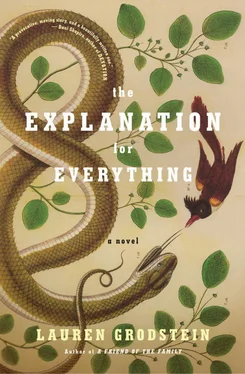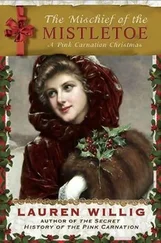“When is Melissa coming over?” Rachel asked one icy Saturday morning in February as she laid out clothing on her bedroom floor. The fifth-grade father-daughter dance was at the end of March and evidently this required wardrobing. She stretched out a pair of jeans with rhinestones on them he couldn’t remember buying her, black T-shirts. A pink miniskirt with zebra-print trim.
“Where’d you get all that stuff?”
“Borrowed,” she said. Belle was sitting on the top bunk, surveying the landscape. “A lot of it came from Lily Dreisinger.”
“Who’s Lily Dreisinger?”
Rachel shrugged, as if it would be too difficult to explain. “I hate all this stuff anyway. When is Melissa coming over? She said she’d take me to the Cherry Hill Mall.”
“I’ll take you to the Cherry Hill Mall,” Andy said, sitting down on the floor to riffle through his daughter’s clothing. Some of it was in women’s sizes now, 2 or 4. He had thought she was a kid’s size 14; in fact, was proud of himself for knowing not only who his kids’ teachers were and the names of their dentists and dance teachers but also their sizes in both shirt and shoe. “Is this a training bra?”
“God, Dad, no! Ew! It’s a tank top!”
“Yeah, but it has—”
“Give it to me!” Rachel said, snatching it away, her cheeks red, her arms folded around the top as though it were a victim.
“It’s like a tank top with a bra inside,” Belle explained from the top bunk. “It was Lily Dreisinger’s sister’s.”
“Oh my God, Belle, shut up,” Rachel said.
“Don’t say shut up,” Andy said, absently, wondering what to make of Lily Dreisinger and her sister. Were these enemies or friends of his cause? Did Rachel need a bra? Was he supposed to notice? How was he supposed to notice? He was unable and unwilling to inspect his daughter’s chest, and, unlike his plan to handle menstruation (on her twelfth birthday, he would put a box of maxi pads in her T-shirt drawer) he couldn’t just buy her some training bras (did they still call them training bras?) and stick them in her T-shirt drawer. Unless he could. Maybe that’s what he would do.
He’d ask Melissa.
“What about this?” Andy said, picking up a flowered skirt his mother had bought Rachel when they were in Ohio over the summer. It was from the Gap, a store he thought she liked.
“Too small.”
“It’s mine now,” Belle said.
“But we just got it,” Andy protested, feebly. “Shouldn’t it still fit you?” What did he know about skirts, or girl’s sizes, or his daughters at all? What did he know about girls? Wasn’t it unfair that he had to know it at all? He knew about his mice and his students, he knew their teacher’s names and their dentist’s name, he knew—
His phone buzzed. Thank God it was her. “Did you say you were going to take the girls to the mall?”
“I did,” Melissa said. “Is that okay? Rachel wanted to find an outfit for the father-daughter dance.”
“Sure,” he said, wondering if he could ask her about bras, not her bras, which he hadn’t seen enough of—and here, he remembered, in a flash, Sheila’s beige no-nonsense bra, and his dead wife’s, who had small breasts and wore lacy things without wires, who should be here now, who should be here, who wasn’t here.
Melissa appeared in his driveway half an hour later and returned with the girls at the end of the afternoon; both flounced into the house with more clothing than he had given them money for, and he knew Melissa had bought them things with her earnings, and he also knew he wasn’t going to ask her about it. They displayed their wares fashion-show style: cut-off shorts, a tight-ish plaid shirt for Rachel, purple with lace for Belle. “What do you think?”
He had no idea how to judge a fashion show; the whole thing made him irritable. But he thanked Melissa chastely, waved to her from the door, and she waved and disappeared, and Sheila Humphreys waved too, from her front yard, bundled into her winter coat, because she mistook the direction of his good-bye.
Those early weeks of the semester, Melissa still came into his office to talk about intelligent design, and about God generally, only now she was starting to talk about God in a more relaxed manner, as though he were a friend she thought Andy should meet. In the office, they would tangle with each other’s feet, or he would brush the back of her hand as it riffled through the pages of one of her books, but they didn’t touch each other more than that, and he didn’t argue with her when she talked about her beliefs. He was glad he was not teaching There Is No God this new spring semester. He didn’t know how he would be able to argue with Lionel Shell with the necessary vigor.
“Tell me more about this God of yours, anyway.”
“What else do you want to know?”
Really, he just liked hearing her talk, and he liked letting her talk him into things. “I mean, how do you imagine him? Does he have a white beard? Sit on a throne?”
“What does God look like? I have no idea,” Melissa said. “We’re supposed to be created in his reflection but I really don’t know—I don’t think that means we look just like him. I think it means that we’re supposed to operate the way he would, do our best to be godly.” She paused, absently scratched her knee like a child might. She was wearing a short blue skirt which showed off blocky knees. Andy wanted to lick them.
“I’ve been trying to picture him,” he said.
“Have you?”
“Just to have—just to have some idea of what you’re talking about when you talk about God. You act like you have a personal relationship with him, but the only God I ever thought about was distant, not really involved in, you know,” he felt silly, “in our day-to-day lives.”
“When did you think about God?”
“As a kid—I don’t know. It’s been a long time. Until I met you.”
“A little kid or older?”
“I can’t really remember,” he said, although he knew that even as a small child, he didn’t take the God idea seriously. He came from a proud line of teachers, Midwesterners, nonbelievers. “I guess the last time I really considered the subject was in high school history class. Learning about pilgrims, Cotton Mather, Jonathan Edwards. Sinners in the hands of an angry God. I still remember that one—being dangled over the fires of hell.”
“You didn’t go to church as a kid?”
Andy shook his head. “My mother taught high school biology,” he said. “She didn’t have the time or patience for church. I remember I asked her where people came from—I was talking about babies, seeing if I could goad her into telling me about sex—but instead she started talking about Darwin. I guess I was eight.”
“Where was your dad?”
“He worked all the time. He ran a handyman business,” Andy said. “He died when I was twenty.”
“Oh.” She looked saddened; he loved her expression when she was sad. Her eyes grew crinkled at the corners, mouth fell open. “You’ve lost a lot of people in your life.”
“It’s really Lou,” he said. “Nobody else matters as much to me. She’s the loss that stings.”
Melissa wasn’t going to try to analyze this, which was good—she only touched his wrist for a minute.
“Did Lou believe in God?”
“No,” Andy said. “We were compatible that way,” although of course it was more complicated than that: Lou believed in more than she admitted—she’d baptized Rachel—and Andy believed in ghosts.
And now it was time to change the subject. Although they were in his office, he leaned toward her, kissed her neck, the softest part.
“No, not here,” she said. “We’re talking.”
“Are we?” But she had pulled away, adjusted her collar primly. He found this girlishness so attractive; Louisa had been sexy, but not particularly girlish, and he had never before reveled in the softness of the skin on the inside of a twenty-one-year-old’s wrist. The softness of the skin under her neck. He touched her neck where he had just kissed it.
Читать дальше












